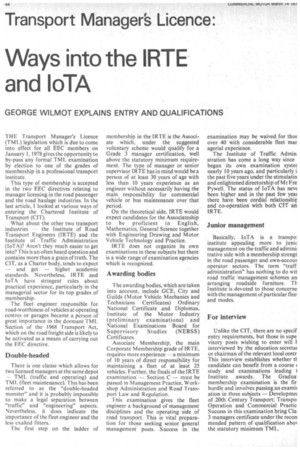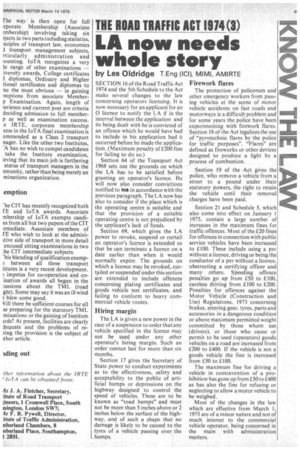Ways into the IRTE and loTA
Page 46

Page 47

If you've noticed an error in this article please click here to report it so we can fix it.
GEORGE WILMOT EXPLAINS ENTRY AND QUALIFICATIONS
THE Transport Manager's Licence (TM L) legislation which is due to come into effect for all EEC members on January 1, 1978 gives the opportunity to by-pass any formal TML examination by election to one of the grades of membership in a professional transport institute.
This type of membership is accepted in the two EEC directives relating to manager licensing in the road passenger and the road haulage industries. In the last article, I looked at various ways of entering the Chartered Institute of Transport (CIT).
What about the other two transport industries — the Institute of Road Transport Engineers (IRTE) and the Institute of Traffic Administration (loTA)? Aren't they much easier to get into? This is an often heard question and contains more than a grain of truth. The CIT, as a Charter body, tends to expect -and get — higher academic standards. Nevertheless, IRTE and I oTA have stringent rules about practical experience, particularly in the managerial sector for its top grades of membership.
• The fleet engineer responsible for road-worthiness of vehicles at operating centres or garages became a person of great importance in the dormant TIVIt Section of the 1968 Transport Act, which on the road freight side is likely to be activated as a means of carrying out the EEC directive.
Double-headed
There is one clause which allows for two licensed managers at the same depot TML (traffic and operating) and TML (fleet maintenance). This has been referred to as the "double-headed monster" and it is probably impossible to make a legal separation between "traffic" and "engineering" aspects. Nevertheless, it does indicate the importance of the fleet engineer and the less exalted fitters.
The first step on the ladder of membership in the IRTE is the Associate which, under the suggested voluntary scheme would qualify for a Grade 3 manager certification, well above the statutory minimum requirement. The type of manager or senior supervisor IRTE has in mind would be a person of at least 30 years of age with less than 10 years experience as an engineer without necessarily having the main responsibility for commercial vehicle or bus maintenance over that period.
On the theoretical side, IRTE would expect candidates for the Associateship to be proficient in English, Mathematics, General Science together with Engineering Drawing and Motor Vehicle Technology and Practice.
IRTE does not organize its own examinations in these subjects but there is a wide range of examination agencies which is recognized.
Awarding bodies
The awarding bodies, which are taken into account, include GCE, City and Guilds (Motor Vehicle Mechanics and Technicians Certificates) Ordinary National Certificate and Diplomas, Institute of the Motor Industry (preliminary examinations) and National Examinations Board for Supervisory Studies (NEBSS) Certificates.
Associate Membership, the main Corporate Membership grade of IRTE, requires more experience a minimum of 10 years of direct responsibility for maintaining a fleet of at least 25 vehicles. Further, the finals of the IRTE examination — Section C — must be passed in Management Practice, Workshop Administration and Road Transport Law and Regulation.
'1 his examination gives the fleet engineer a background of management disciplines and the operating •side of road transport. This is vital preparation for those seeking senior general management posts. Success in the examination may be waived for thos over 40 with considerable fleet mar agerial experience.
The Institute of Traffic Admin stration has come a long way since began its own examination systet nearly 10 years ago, and particularly i the past five years under the stirnulatin and enlightened directorship of Mr Fre Pywell. The status of IoTA has nevt been higher and in the past few yea' there have been cordial relationshir and co-operation with both CIT an IRTE.
Junior management
Basically, loTA is a transpo: institute appealing more to junk management on the traffic and admini: trative side with a membership strengt in the road passenger and own-accour operator sectors. The term "traff: administration" has nothing to do wit road traffic management schemes an arranging roadside furniture. Tli Institute is devoted to those concerne with the management of particular flee: and modes.
For interview
Unlike the CIT, there are no specif entry requirements, but those in supe visory posts wishing to enter will interviewed by the education secretai or chairman of the relevant local centr This interview establishes whether ft candidate can benefit from a course study and examinations leading I Institute awards. The Gradua. membership examination is the fir hurdle and involves passing an examii ation in three subjects — Developmei of 20th Century Transport; Transpo Operation and Commercial Practic Success in this examination bring Cla: 3 managers certificate under the recon mended pattern of qualification abo) the statutory minimum TML. The way is then open for full rrporate Membership (Associate .mbership) involving taking six )jects in two parts including statistics, nciples of transport law, economics I transport management subjects, rticularly administration and :ounting. IoTA recognizes a very le range of other examinations — iversity awards, College certificates diplomas, Ordinary and Higher tional certificates and diplomas to ne the most obvious — in gaining !mptions from associate Memberp Examination. Again, length of )erience and current post are criteria deciding admission to full memberp as well as examination success. .e IRTE, corporate membership cess in the IoTA final examination is ommended as a Class 2 transport nager. Like the other two Institutes, 'A has no wish to compel candidates take the Institute examination, ieving that its main job is furthering status of transport managers in the =unity, rather than being merely an minations organization.
emption
'he CIT has recently recognized both TE and IoTA awards. Associate mbership of IoTA exempts candies from all but two papers of the CIT :rmediate. Associate members of TE who wish to look at the adminiitive side of transport in more detail excused sitting examinations in two :he CIT intermediate subjects.
his blending of qualification exempt between all three transport titutes is a very recent development. impetus for co-operation and coination of awards all began in the ussions about the TM L (road ght). Some may say it was an ill wind t blew some good.
Vill there be sufficient courses for all se preparing for the statutory TML minations or the gaining of Institute trds? At present, facilities are clearly dequate and the problems of rering the provision is the subject of rther article.
lding out
.ther Information about the IRTE In TA ran he obtained from:
4r J. A. Fletcher, Secretary, :itute of Road Transport :ineers, 1 Cromwell Place, South isington, London SW7; 4r F. R. Pywell, Director, itute of Traffic Administration, nberland Chambers, 8 nberland Place, Southampton, 2BH.








































































































